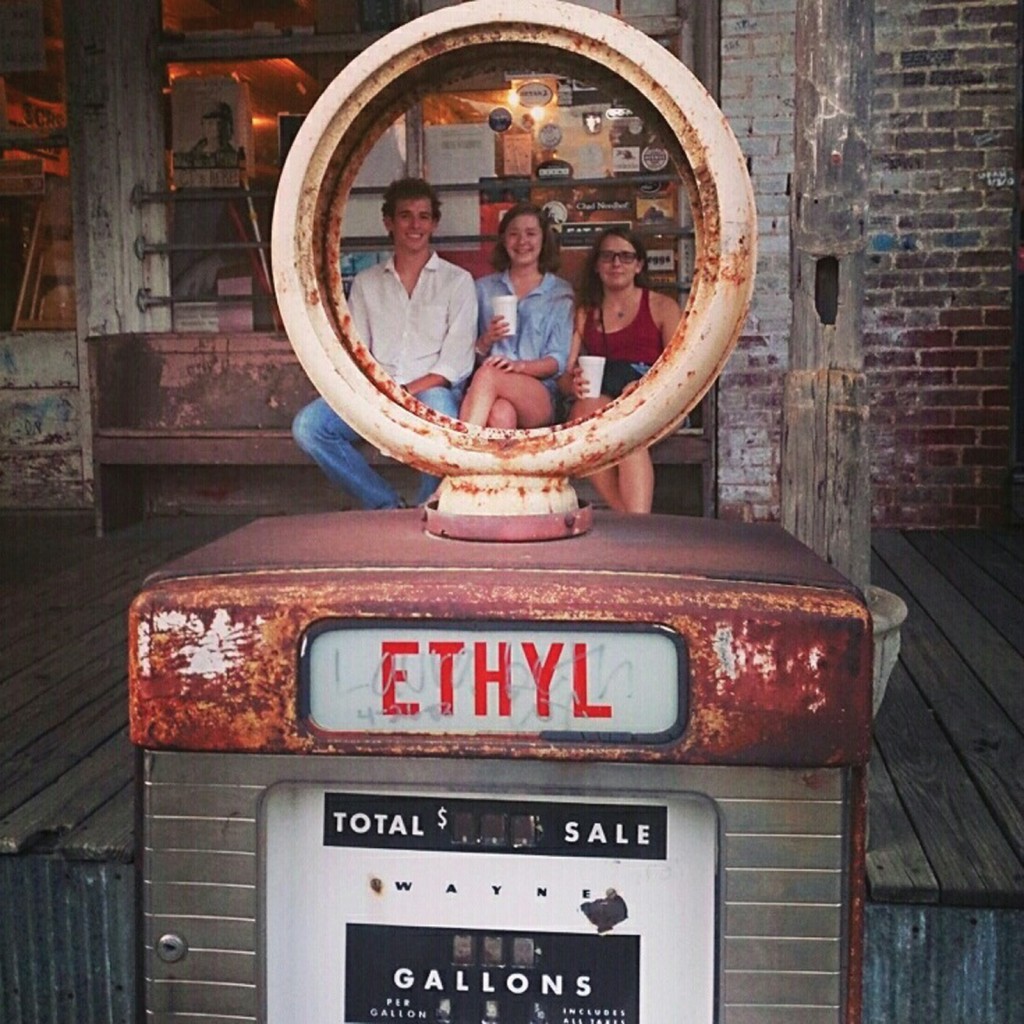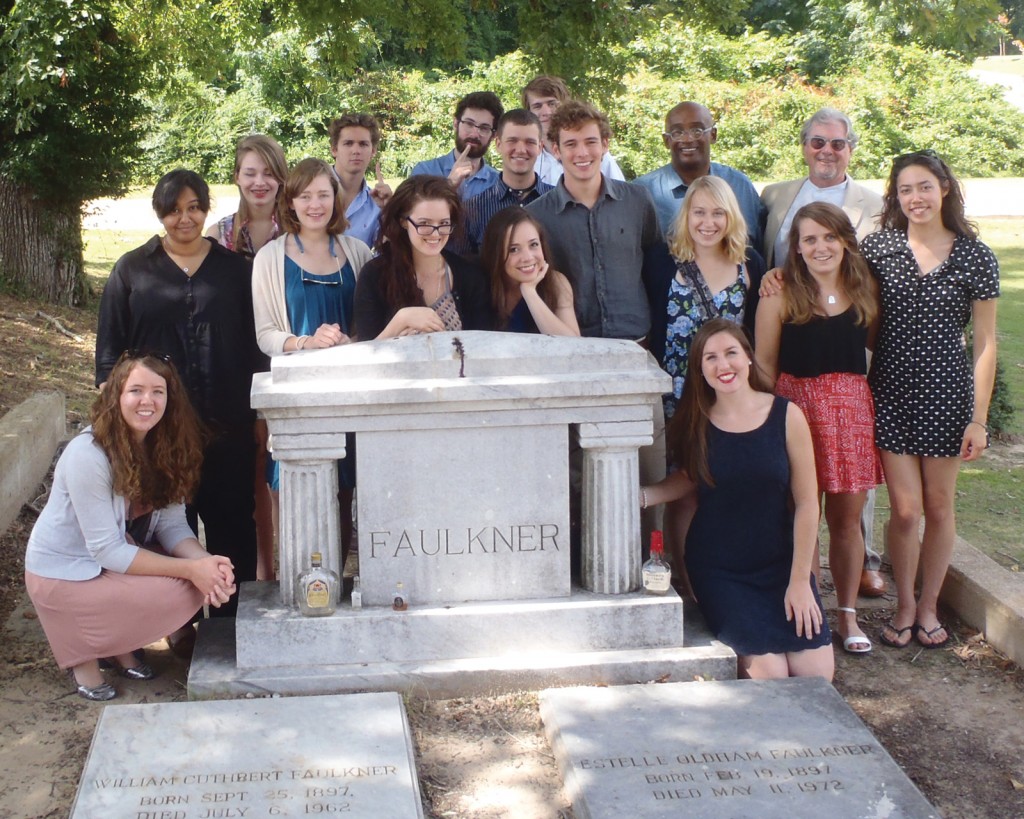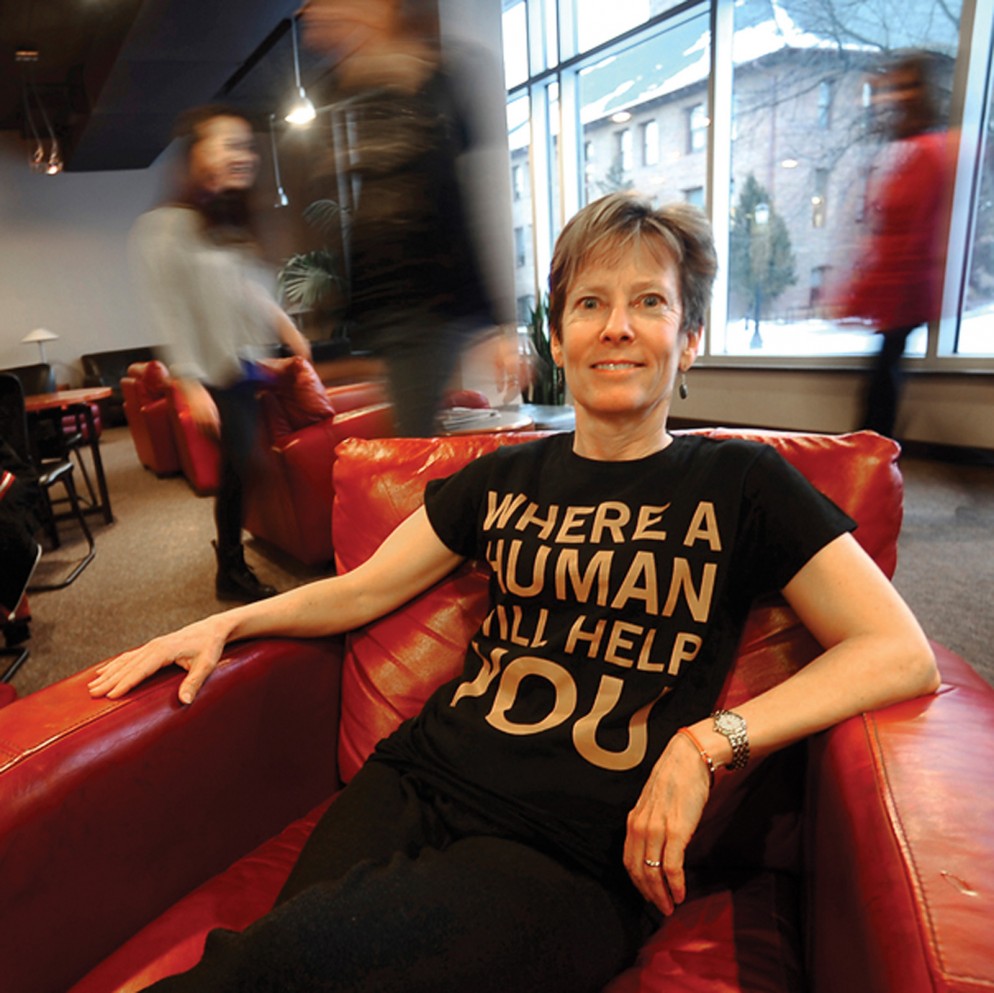Creating the Center for Immersive Learning and Engaged Teaching
It will be a dynamic place, the core of the campus, where students, faculty, staff, and alumni come together and resources are available to discover and share best practices and support new ideas. It will help us realize the potential of the Block Plan.
It’s 3 p.m. Typical school day on the CC campus.
If you’re a student looking for a quiet, comfortable place to study or a professor trying to find a spot for an impromptu meeting, don’t go to the Learning Commons in Tutt Library.
You’re way too late — the place is already packed.
The Learning Commons, with its enveloping leather sofas and hushed atmosphere in the intellectual hub of the campus, is the favored location for curling up to study. And if you haven’t arrived by 1 p.m. or reserved a spot on one of the couches or chairs, you’re out of luck.
This presents a problem if you are one of the members of the team tasked with instituting the programs that will form the framework for the new Center for Immersive Learning and Engaged Teaching.
“Space is a huge challenge. We want to initiate all these cool new programs, but we have no space to put them,” said Anne Hyde, CC professor of history, director of the Crown Center for Faculty Development, and head of the aforementioned committee.
Enter, the Center
Creating a Center for Immersive Learning and Engaged Teaching is the linchpin of Recommendation 1 of CC’s strategic plan — “The Colorado College Plan: Building on the Block.” Recommendation 1 calls for providing additional support to realize the potential of the pioneering Block Plan. And to support faculty and students as they experience the full potential of the Block Plan, CC will create a center that will be a focal point for academic support.
The center will bring together, under one roof, the offices of sustainability, community engagement, international programs, and academic technology, as well as the Help Desk, the Crown Faculty Center, and the Colket Student Learning Center. It also will house new resources, such as an Office for Field Study to support faculty as they design and implement field trips. The center will support undergraduate research and writing.
It also will extend CC’s reach by instituting in-residence programs for artists, scholars, social entrepreneurs, journalists, postdocs, and filmmakers. A staff member from the Alumni Relations Office will help faculty connect with alumni and parents who are experts in their fields so they can enlist them to engage with classes. One of the center’s most important roles will be to develop a higher profile for the Block Plan by researching it and sharing the findings.
Finally, CC will renovate Tutt Library to provide a physical home with more space for the new center and to prepare the library for this generation of students. The space will offer technology-equipped seminar rooms, study space, and group collaboration rooms, as well as a café.
The Pilot Projects
As part of the next phase of thinking about the new center, President Jill Tiefenthaler has allocated funds this academic year to support exciting pilot projects that demonstrate how the center might enrich the college’s scholarly and pedagogical life.
A request for proposals from faculty members was released at the end of last semester and the first pilot projects for the center have been selected.
These projects embody the intent of the center and demonstrate its potential; created within the campus community and reflective of CC’s multifaceted nature, they further the scholarly work of students and faculty. Out of 14 proposals received, the committee so far has approved three projects for funding.
The pilot programs selected thus far are:
- $6,700 to employ CC’s advanced Italian language students to add English subtitles to the film “Vecchia Guardia,” (Old Guard) by Alessandro Blasetti. The debut of the newly subtitled film will be held on campus when the project is complete.
- $3,000 to train student peer tutors in the Writing Center in oral communications. Hyde said students on campus have been asking for help developing their public speaking skills; this project will bring in professionals to train student peer tutors, who can then help train other students needing help.
- $8,000 to develop a summer program in which CC education students and teachers in Colorado’s San Luis Valley will collaborate to create and implement culturally appropriate curricula for students in the valley.
The pilot programs will begin in summer 2014.
The Library of the Future (Is it Even Called a Library?)
Having a cutting-edge academic commons at the heart of the campus is becoming increasingly important for top-tier colleges to stay competitive. Will it be called a library in the future? That remains to be seen.
“I don’t know if it will be called a library. It’s not so much about books, although there will still be books, of course. It’s more about help with research, databases, other resources — how to navigate the overwhelming amount of material,” said Hyde. “But it will also be a place where faculty can imagine new courses and create them, where students can get help developing a research project. The center will be a place where problems are solved; where, if you come asking questions, a human will help you find answers.”
“Students come to us and say, ‘I’m interested in doing X, but how do I start?’ For example, with Venture Grants, we have some very entrepreneurial students who can figure it out on their own. But we ought to be making it easier for more students.”
A big part of the problem with developing new programs and resources to help students and faculty is where to put them. There simply is no space available.
“We bring these fantastic scholars and experts to campus and they have no place to go to work with students. We can’t even find space to have our committee meetings! We need flexible, undedicated space where these programs, activities, and impromptu meetings can happen. We’ve even joked about getting fancy yurts and putting them out on the quad for space,” said Hyde.
The Tutt Library Renovation
Renovating any campus building, especially a library, is a serious commitment and investment of college resources. This commitment is recognized by the CC Board of Trustees. With an early budget estimate of $40-$45 million, the board has prioritized this initiative by establishing a trustee-led Strategic Project Team (SPT) that, along with President Tiefenthaler, is overseeing the overall renovation effort.
One component of the SPT charge is overseeing the work of a 16-member campus-based action team of faculty, staff, and students that was appointed by President Tiefenthaler. This action team is helping to both identify the programming of the space and lay the groundwork of envisioning the collaboration between programs and flexible spaces needed to support both faculty and student work.
Sandra Wong, dean of the college and head of the campus action team, said the team has gathered and reviewed descriptions and images of new or recently renovated libraries and academic commons throughout the U.S. and abroad. In mid-February, a sub-committee of the campus team, with trustee representation, interviewed four firms that specialize in programming and conceptual design. The chosen firm/consultant will solicit input and ideas from the campus community so that the renovated space and center will serve the needs of multiple users. After the programming and conceptual design phases are complete, architectural firms will be selected to plan and undertake construction.
What most excites Wong, she said, is the opportunity to incorporate state-of-the-art design ideas into the new library. “We have seen how other colleges and universities are re-conceptualizing their library space by integrating academic services and informational technology, and by creating versatile areas for individual study and reflection, group projects and problem-solving, and cross-disciplinary conversations,” Wong said. “It is exciting.”
But although Wong said CC could easily adopt or reproduce the models others have chosen, the team is committed to identifying features that are well suited to Colorado College’s location, to unique ways of teaching and learning, and to the possibilities of our distinctive Block Plan.
“We have been especially attentive to the use of natural light, to ample seating arrangements and furnishings, and materials that offer comfort, mobility, and choice. Whether we are talking about the storage and accessibility of collections, the availability of event spaces, exhibits, and coffee, or ceiling heights, acoustics, and ambience, we are imagining settings in which knowledge can be both shared and produced,” she said.
“We see the new library design facilitating the planning of field trips and field study, enabling students to find academic support in one dynamic place, and increasing the chances that people from different parts of the campus will connect. In these ways we hope the library and center will help us to celebrate and make the most of our capacity for communication, interaction, and ingenious new projects,” said Wong.

Students pose at Old Taylor Grocery outside Oxford, Miss., the model for Frenchman’s Bend, a township that figures in several William Faulkner novels. Off-site classes like this will be easier for faculty to plan and execute with the services at the Center for Immersive Learning and Engaged Teaching.
Why Study the Block Plan?
An important part of the center will be studying the Block Plan, CC’s one-course-at-a-time academic calendar that allows for complete immersion in a subject area and flexibility in scheduling field study and bringing in visiting experts to speak to classes.
Students and alumni have positive feelings about the Block Plan, the experiences and skills it fosters, and what it has allowed them to do in their lives and careers.
Verdel Baskin ’99 recently was promoted to enrollment manager at Walden University, where he has worked for four years as a counselor. After graduating from CC, he went on to get his master’s in psychology and is now working on his Ph.D. He is effusive about the academic and life skills he learned.
“CC and the Block Plan really allowed me to become who I am! My experiences there allowed me to see life in a way that was not just classroom-based. It wasn’t rigid; you had freedom of thought and in how you pursued your education,” Baskin said.
The Block Plan, and particularly his professors, also helped Baskin realize that he was capable of much more than he could have imagined.
“So many times in a class we would be assigned to read a whole book in one day, then write a paper and be prepared for discussion the next day. At first, that was very daunting. But when you realize that is the reality of life on the Block Plan, and that you have the support of your professors, you begin to see, ‘It is possible! I can go to new heights!’” he said.
In his work, Baskin observes many people who have difficulty adapting to change and are reluctant to embrace it. Again, the Block Plan made that adaptability a given for him.
“Change is constant, especially in our world today. The Block Plan allowed me to adjust to change faster, to keep up with the changing landscape. It actually comes easily to me after CC,” Baskin said.
Woody Fischer ’00 is an assistant professor of geobiology at the California Institute of Technology, where he has been for five years. In 2011, he was one of 16 researchers who received a coveted Packard Fellowship in Science and Engineering with a research grant of $875,000.
As a professor, Fischer has an interesting perspective from which to judge his CC education.
“The Block Plan is incredibly good for experiential learning. In most schools, Earth Science students might take a serious trip for fieldwork once or twice a year. At CC, enabled by the Block Plan, every single course gets the students into the field for multi-day excursions. In earth science, the more you see in the field the better scientist you become. It’s nearly that simple. In earth science research, CC students are way overrepresented because they get such a big head start in field work,” Fischer said.

Students in Professor Barry Sarchett’s English 381: Faulkner class travel to Oxford, Miss., to visit sites important to William Faulkner and allow the great American novelist to “come to life.”
“From my perspective now as a professor, I can see a very bright future for the Block Plan as a unique and powerful mode of education. Online courses are becoming incredibly important tools for student learning. This is excellent for democratizing education. However, these courses miss two things:
- One-on-one time (or working in small groups with other students) with professors, and
- Experiential learning through doing. CC and the Block Plan do both of these things uniquely well. Other schools with standard schedules can pick up the first item, but they cannot excel at the second like CC can.”
But anecdotal evidence of the Block Plan’s success is one thing; scientific, peer-reviewed research is another. The strategic plan calls for studying the Block Plan from a critical perspective.
“We say this all the time, that the Block Plan is better. But we haven’t done any credible studies. We should know for sure how it is better and where it needs work,” said Anne Hyde.
One area of Block Plan research being considered as a pilot project would compare student success in introductory science classes on the Block Plan versus a traditional semester system, Hyde said.
Other topics that will be studied at the center include being more deliberate about making connections between the blocks and sustaining the sense of community that is created in a class, even after the block is over.
“One class at a time can be insular if we’re not careful. We want to do a better job of encouraging students to take a breath and think about what they’ve been doing in past blocks, to be more reflective,” she said. “We want to be able to better support learning on the block.”
The Center for Immersive Learning and Engaged Teaching should allow the college to do just that.
Watch a video: History Professor Tip Ragan has more than a few ideas on how CC’s new Center for Immersive Learning and Engaged Teaching will assist him in teaching.
